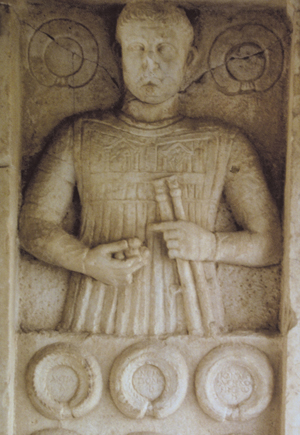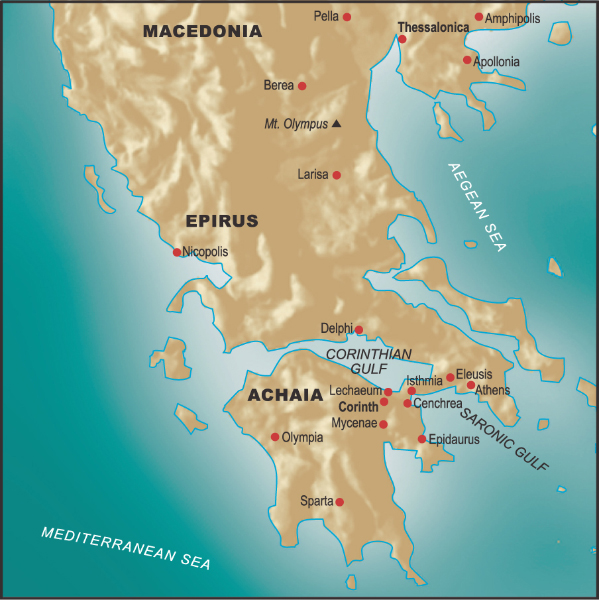Defense of Paul’s Past Visit to Thessalonica (2:1–16)
The central theme of 2:1–16 is a defense of Paul’s integrity during his past visit to Thessalonica. That this defense of his integrity was a major concern to the apostle is clear from the fact that it is the first topic he chooses to take up in the body of the letter. The importance of this subject is also evident from the way in which he foreshadowed his defensive concern in the thanksgiving (see comments on 1:5).
From whom is Paul defending himself? Paul’s opponents come from outside the church. The good report of Timothy about the congregation (3:6), the exemplary character of the Thessalonian believers’ life (1:6–7), Paul’s description of them as “our glory and joy” at Christ’s return (2:19–20), and his frequent reference to them as “brothers”(1:4; 2:1, 9, 14, 17; 3:7; 4:1, 13; 5:1, 4, 12, 14, 25) make it impossible to conclude that Paul was facing attack from believers inside the church. The best candidate for opponents outside the church are “your own countrymen”(2:14): unbelieving citizens of Thessalonica who not only persecuted the church but also attacked the church’s leader, Paul, who was, in their minds, the source of the problem.
What were the charges brought against Paul? A careful reading of 2:1–16 reveals that Paul is defending himself against attacks on his integrity and the genuineness of his motives. Non-Christians in Thessalonica accused Paul of being no different than other wandering philosopher-teachers of his day: those who taught and spoke only to receive money and praise. There are enough clues available to see how unbelievers in Thessalonica opposed to this new religious movement founded by Paul might “spin” certain facts in a way in which the apostle’s integrity would be questioned. The fact that Paul received money at least twice from the Philippian church during his original ministry in Thessalonica (Phil. 4:16), the fact that Paul converted among others in Thessalonica “not a few prominent [i.e., wealthy] women” (Acts 17:4) as well as Jason, who was rich enough to host the missionaries and post bond for them (17:5–9), the fact that Paul abruptly left the Thessalonian church, leaving them “orphaned” (see 1 Thess. 2:17) and has not yet returned to Thessalonica or, prior to this letter, even written them (3:1–6)—all this information could easily be used by opponents of the Thessalonian church to question the integrity of its founder.14
Our visit to you was not a failure (2:1). The NIV’s translation of kenē as “failure” is better rendered here as “insincere.” Paul, then, is defending the honesty of his motives during his past visit rather than the positive results of that visit.
Nor are we trying to trick you (2:3). The word “trick” (dolos) originally referred to catching fish by means of a bait and so developed the metaphorical meaning of “deceit, cunning, treachery.”15 Paul claims that he used no dishonest means to trick people into believing his preaching. The apostle’s conduct, therefore, differs sharply from that of wandering philosopher-teachers, who employed various methods of deception to win followers and financial gain.16
We were gentle among you (2:7a). Instead of the word “gentle” (ēpioi) found in the NIV, more ancient and reliable manuscripts have the word “infants” (nēpioi), so that a better translation of this text reads: “We became infants among you.”17 This is the first of three striking family metaphors that Paul uses in this passage: “infants” (2:7a), “mother” (2:7b), and “father” (2:11). The purpose of this first metaphor of infants is to highlight the apostle’s integrity. Unlike the wandering philosopher-teachers of that day, who were only interested in “pleas[ing] men” and who “used flattery” as a “mask to cover up greed” (2:4–5), Paul and his fellow missionaries acted as innocent as infants. Philo similarly speaks about the innocence of infants, claiming that “it is impossible for the greatest liar to invent a charge against them, as they are wholly innocent” (Special Laws 3.119).
Like a mother (2:7b). Instead of the common word for “mother” (mētēr), Paul employs a term with the specialized meaning of “wet nurse” (trophos), someone who suckles children. The use of wet nurses was widespread in the Greco-Roman world, and ancient writers typically portrayed the wet nurse as an important and beloved figure.18 Since the original text refers to this woman nursing her own children, Paul has in view here the natural mother rather than the hired wet nurse. Yet he uses the unusual term trophos because this metaphor of a nursing mother underscores his sincere love for the Thessalonian Christians. A hired nurse competently cares for the children in her charge, but she cherishes her own children even more.
We loved you so much (2:8). The meaning of the rare verb used here (homeiromai) is illuminated by a fourth-century A.D. tombstone inscription (CIG 3.4000.7), where the term describes a father and mother’s sad yearning for their deceased child. The word, therefore, expresses the deep affection that Paul has for the Thessalonian Christians, an affection like that between a parent and child.
We worked night and day (2:9). Although Paul does not say what kind of work he did, there are hints at his profession. He and his colleagues worked “with our own hands” (1 Cor. 4:12; cf. Acts 20:34), probably as tentmakers (Acts 18:3). Since tents were usually made with leather, it may be better to call Paul a “leather worker,” one who not only made and repaired tents but a range of leather goods.19 Paul likely learned this trade as part of his rabbinical training, since Jewish teachers were expected to support themselves by some form of labor.20
As a father (2:11). Paul likens himself to a father when he wants to emphasize the nurturing or instructional role he played in the lives of his converts.21 The father in the Greco-Roman world was normally responsible for the education and training of his children.
The Jews, who … (2:14–16). The strong language that Paul uses in these verses to describe the Jews has led some to claim that this text is anti-Semitic and cannot have come from the hand of the apostle but is instead an addition inserted in the letter by a later writer.22 Although the language is admittedly harsh, it stems from Paul’s frustration with fellow Jews whose behavior has threatened the Gentile mission. The apostle does not have in view all Jews but only those who in some way were involved in the events mentioned in verses 15–16.23 Furthermore, Paul speaks here somewhat hyperbolically as he also does elsewhere in his writings.24
The wrath of God has come upon them at last (2:16). There are a number of national disasters that the Jews suffered to which Paul may be referring: e.g., the famine in A.D. 46 (Acts 11:28), the banishment from Rome in A.D. 49 (Acts 18:2), persecutions under Tiberius Alexander.25 It is also possible, however, that the apostle is writing about an imminent judgment rather than a past one.26
Defense of Paul’s Present Absence from Thessalonica (2:17–3:10)
The unbelieving citizens of Thessalonica (2:14) not only attacked the integrity of Paul with respect to his past visit to the city (2:1–16) but apparently also used the apostle’s inability thus far to come back to the fledgling church to cast further doubts about the genuineness of his motives. One key concern of Paul in this section of the letter, therefore, is to reassure the Thessalonian Christians of his continued love and concern for them, despite his present failure to return for a second visit.
A second key concern focuses on the suffering that the Thessalonians are enduring for their commitment to Christ. Paul wants to encourage them to remain steadfast in their newfound faith even in the face of opposition. Although this second concern about persecution differs rather greatly from the first concern about Paul’s separation from the Thessalonians, there is a link that logically connects these two topics together: Paul’s original departure from Thessalonica and his inability to return were both the result of the same persecution that the believers in that city are currently experiencing.
Therefore, despite the differing themes that are addressed, 2:17–3:10 follows a logical line of argumentation. Paul begins with the first concern of his separation from the Thessalonians in 2:17–20. He then addresses the second concern of persecution in 3:1–5. The apostle concludes his argument by bringing the two concerns together in the good report about the Thessalonians given by the returning Timothy in 3:6–10.
We were torn away from you (2:17). The verb aporphanizō literally means “to be orphaned.” The apostle thus depicts himself as a parent who has been orphaned from his children. This orphan metaphor conveys to the believers in Thessalonica Paul’s feelings of deep anguish because of his separation from them.
Satan stopped us (2:18). The verb enkoptō, which literally means “to cut into,” originally referred to the military practice of cutting up a road so as to make it impassable for a pursuing army.27 Paul wants his readers to know that his present absence from them is not due to his personal choice but to the activity of Satan, who, in typical military fashion, has destroyed the apostle’s path back to Thessalonica.
The crown in which we will glory (2:19). The crown that Paul refers to is not a royal tiara but a laurel wreath given to the victor in a Greek athletic contest. These crowns were woven out of palm or other branches, flowers, or certain plant life.28 Such crowns or wreaths would thus soon deteriorate—unlike the imperishable and unfading crown given to believers (1 Cor. 9:25; 1 Pet. 5:4). Paul encourages the Christians in Thessalonica by confidently claiming that they will be his victory wreath at the return of Christ.

ATHLETE WITH WREATHS
A stone relief from Isthmia depicting a victorious athlete with his crowns.
We/I could stand it no longer (3:1, 5). Paul twice uses the uncommon verb stegō, which originally referred to keeping water out of a vessel, such as with a watertight house or a boat that doesn’t leak.29 The image that the apostle paints, therefore, is of his deep affection for the Thessalonians that he is no longer able to contain within himself and prevent from leaking out.
But Timothy … has brought good news about your faith and love (3:6). Timothy returns from Thessalonica with a good report that takes up the two concerns raised earlier in this passage. Paul’s first concern about his separation from the Thessalonians (2:17–20) is answered with the news of the church’s “love” for him: “that you always have pleasant memories of us and that you long to see us” (3:6). Paul’s second concern about the persecution that his converts are enduring (3:1–5) is answered with the news of the church’s “faith”: that “in all our distress and persecution we were encouraged about you because of your faith … since you are standing firm in the Lord” (3:7–8).
